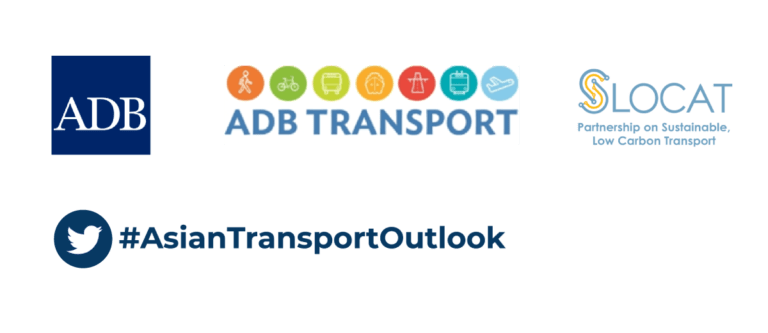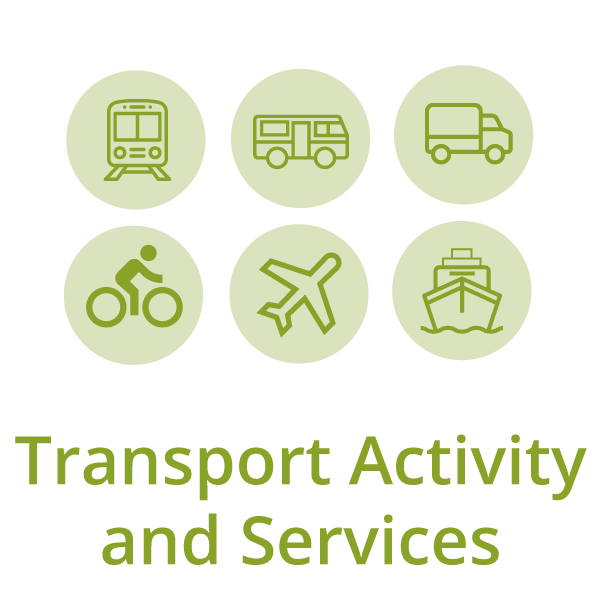Asian Transport Outlook
ADB has initiated the Asian Transport Outlook (ATO) to strengthen the knowledge base on transport in Asia and the Pacific region. The ATO is developed in support of the planning and delivery of ADB transport sector assistance.
At the same time, the ATO supports Asian governments in transport policy development and delivery. ADB is working with other interested parties in developing the ATO as an instrument to track the implementation of the Sustainable Development Goals, the Paris Agreement and other relevant international agreements on sustainable development in the transport sector.
Likewise, the ATO also serves as input in regional transport initiatives, such as the ESCAP Regional Action Programme for Transport Development in Asia and the Pacific, the ASEAN Kuala Lumpur Strategic Action Plan and the Environmental Sustainable Transport Forum 2021-2030 Declaration on Sustainable Transport.
The ATO is an open data resource that creates an institutionalized process for transport data and policy information collection, analysis and documentation.
The ATO collects, organizes, and shares data on the transport sector in 51 countries using more than 450 indicators. It also documents the institutional frameworks, policies, and financing of transport in these countries. This is a multiyear program initially funded by ADB but eventually intended to become a stand-alone program with funding from multiple sources.
SLOCAT supported Phase 1 of the ATO from November 2020 until April 2021.

Track Global Agreements
The ATO is developed in support of the planning and delivery of ADB Transport Sector Assistance. At the same time, the ATO supports Asian Governments in transport policy development and delivery.
The ADB is working with other interested parties in developing the ATO as an instrument to track the implementation of the Sustainable Development Goals, the Paris Agreement and other relevant international agreements on sustainable development in the transport sector.
Likewise, the ATO also serves as input in regional transport initiatives, such as the ESCAP Regional Action Programme for Transport Development in Asia and the Pacific, the ASEAN Kuala Lumpur Strategic Action Plan and the Environmental Sustainable Transport (EST) Forum 2021-2030 Declaration on Sustainable Transport. The ATO is an open data resource that creates an institutionalized process for data and information collection, analysis and documentation.
ATO Outputs
The information collected through the ATO is documented in Excel Workbooks that are available for download. The information is initially organized by categories and sub-categories.
For information on the structure of the ATO sharable database, please see the ATO user guide.
Data will be released in batches. Following the initial launch of the ATO, containing 234 indicators in March 2021, a second version of the Sharable Database was published in May 2021 with 58 new or modified indicators.
The ATO user guide provides an overview of the ATO indicators documented in the ATO Master List of Indicators divided by main categories and sub-categories. It describes the procedures for adding, subdividing or deletion of indicators.
The ATO user guide also describes how to sort ATO indicators by type or scope as well as their linkages to global and regional processes on sustainable development and climate change. It also defines the linkage between ATO indicators and ADB’s Operational Priorities under ADB Strategy 2030.
The structure of the ATO shareable database is also described in the guide. It also includes an introduction to the different country typologies that can be applied to presenting individual ATO indicators.
The ATO consists of over 450 national and regional level transport related indicators divided over eight main categories:
Infrastructure (INF) describes in quantitative and qualitative manner (a) physical road, rail, waterways-ports, aviation-airport infrastructure that enables transport, (b) ICT Infrastructure, (c) infrastructure to produce different types of fuels used in transport). [Download data here]
Transport Activity and Services (TAS) describes in quantitative and qualitative manner all forms of transport activity and services through the use of transport infrastructure. This includes description of the vehicles used in transport. [Download data here]
Access & Connectivity (ACC) describes access (physical or digital) provided by different forms of transport and the connectivity characteristics of transport systems at different geographical scales. [Download data here]
Road Safety (RSA) describes all information related to the safety of transport and combines: (a) information on traffic accidents (fatalities and injuries) (b) safety features of transport infrastructure, (c) safety features of vehicles used in transport. [Download data here]
Air Pollution and health (APH) describes all information related to transport related ambient air pollution and non-road safety health related and includes (a) Ambient air quality, (b) vehicle related air pollutant emissions, (c) fuel quality characteristics, (d) general health related information, e.g. activity levels. [Download data here]
Climate Change (CLC) describes all information related to transport related climate change and combines: (a) ambient GHG emissions, (b) vehicle related energy consumption and GHG emissions, (c) climate vulnerability and impacts of transport infrastructure. [Download data here]
Socio-Economic (SEC) describes all information on: (a) socio-economic parameters that drive the development of transport, and (b) specific economic impact of transport and its externalities on society at large as well as on households. [Download data here]
Miscellaneous (MIS) a rest category for all other indicators. [Download data here]
A full list of the indicators included in the ATO is available in the ATO Master List of Indicators.
It is expected that over time indicators will be added to the ATO, or that indicators will be dropped from the ATO. If this is the case the Master List of ATO Indicators will be updated.
In addition to this national and regional level database, an urban level transport database is under development which will capture transports systems in over 500 cities in Asia and the Pacific. This urban database will be online in Phase 2 of the ATO, which is scheduled to start later in 2021.
ATO Data Analysis
ADB actively encourages the use of ATO data in transport research and policy analysis. We would highly appreciate if you could share the results of your analysis with the ATO team at ato@slocatpartnership.org.
- What is the Current Status of Road Transport Infrastructure in Asia?
- High-Speed Railways – The State of Play in Asia
- How efficient are Rail Freight Mode Shift Policies in Asia?
- How is the Transport Connectivity to National and International Markets?
- What is the Status of Urban Transport Access in Asia?
- What is the status of Rural Access in Asia?
- What is the status of ICT in Asia?
- What is the status of Logistics Efficiency in Asia?
- What is the status of Road Traffic Crash Fatalities in Asia?
- What is the status of Fossil Fuel subsidy in the transport sector in Asia?
- What is the Status of Renewable Energy in the Transport Sector in the Asia Pacific Region?
- What is the status of Transport Sector Air Pollution in Asia?
- What is the status of Transport Sector CO2 Emissions in Asia?
- How many jobs does the transport sector generate?
- How much is the transport share in household expenditures?
- How much is the average wage rate in the transport sector?
- What is the Status of International Trade in Transport Services?
- How much Does Transport Sector Contribute to the GDP?
- How effective could be Telecommuting in ATO economies?
- What is the status of e-commerce in Asia?
Resources
ATO Policy Information
As part of the ATO a beginning has been made with the collection of information on transport policy in the Asia Pacific region. This has resulted in the development of an Annotated Repository of Transport Related Policies, covering close to 400 policy documents for the 51 ATO economies.
As part of the process of collecting policy information 51 country profiles have been developed and a country by country overview of transport related policies and targets have been developed. These will be published on this website following further quality control and validation. For now, transport researchers who would like to access these documents for research purposes and/or would like to contribute to the QA-QC process are requested to contact the ATO team at ato@slocatpartnership.org.







